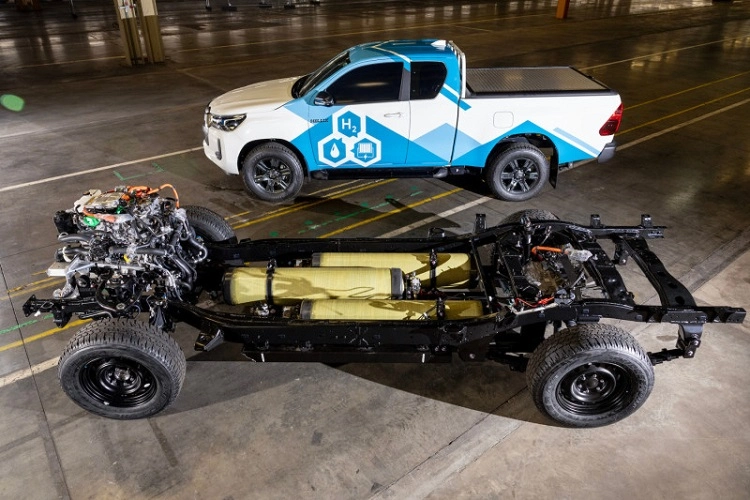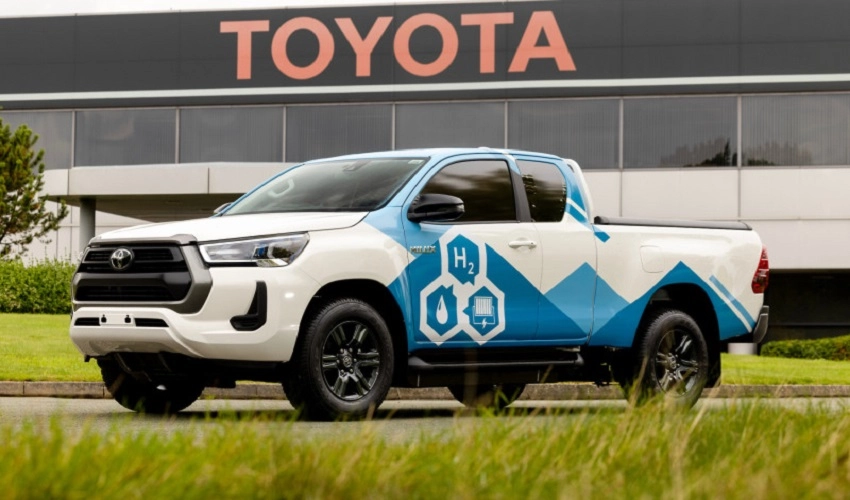Toyota Achieves Another Milestone in Its Carbon-Free Emission Future with the Introduction of the First Hydrogen Fuel Cell Electric Hilux Prototype.
With this pickup truck, the company aims to cater to diverse user needs and operational environments worldwide, expanding beyond electric, hybrid, and plug-in hybrid vehicles.
The Hilux was unveiled at the Toyota Manufacturing UK plant in Derby, England, where it was developed as part of a collaborative project with consortium partners, supported by funding from the UK Government.
Hilux is a global brand icon known for its exceptional reliability and durability.
The development project explored how these qualities could be maintained while adopting a new zero-emission hydrogen fuel cell electric propulsion system.


Features of Toyota’s New Hilux
The new powertrain incorporates core elements from the Toyota Mirai, a hydrogen fuel cell electric sedan, with a proven track record of nearly 10 years in commercial production.
When driven, the fuel cell produces no emissions other than pure water.
Hydrogen is stored in three high-pressure fuel tanks, providing the Hilux prototype with a driving range of over 600 km, far beyond what could be achieved with a battery electric system.
The hybrid battery, which stores electricity generated on-board by the fuel cell, is located in the rear cargo platform, avoiding cabin space loss.
Read more: Toyota supplies hydrogen fuel cell powertrain kits to US truck manufacturers
Project Genesis
The project began in early 2022 with a feasibility study conducted by Toyota Motor Manufacturing UK (TMUK) and Toyota Motor Europe.
Subsequently, funding was secured from the UK Government through the Advanced Propulsion Centre, a non-profit organization supporting cleaner technology development and new mobility concepts.
This allowed the start of an intensive design and development program from July 1, 2022, with consortium partners Ricardo, ETL, D2H Advanced Technologies, Thatcham Research, and additional support from Toyota Motor Corporation (TMC).
The construction of the prototype began on June 5th this year, adhering to Toyota’s Production System principles in a dedicated area within TMUK facilities.
The first vehicle (out of 10 planned to be built by year-end) was completed just three weeks later.
These units will undergo rigorous testing to ensure safety, dynamic performance, functionality, and durability meet the high standards required of a production model.
The project allowed TMUK members to develop and apply new skills related to hydrogen fuel cell electric vehicles and hydrogen system components.
Consortium members also played key roles in the early program phase.
Ricardo supported prototype construction preparations, conducting design and development tasks and validating the entire manufacturing process in parallel with TMUK teams.
Ricardo will conduct a comprehensive vehicle evaluation over the coming months before making a decision on a potential production model to be introduced in the latter half of this decade.
About the Consortium Members
TMUK produces Corolla Hatchback, Touring Sports, and Commercial models at its production facility in Burnaston, Derbyshire, and hybrid engines at its Deeside, North Wales facilities.
TMUK started production in 1992 as Toyota’s first wholly-owned manufacturing company in Europe and became the company’s first location for hybrid electric vehicle manufacturing outside of Japan.
To date, Toyota has invested over £2.75 billion in its manufacturing operations in the UK. It currently employs more than 3,000 people and supports many additional jobs in its extensive supplier network in the UK.
Ricardo is a global strategic engineering and environmental consultancy specialized in the transport, energy, and scarce resources sectors.
Ricardo supported the technical integration of fuel cell components into the Hilux chassis.
European Thermodynamics (ETL) is committed to delivering high-integrity thermal solutions through design excellence and innovation.
ETL explored reversible and multi-fan arrangements.
D2H Advanced Technologies provides high-tech engineering services in simulation, modeling, aerodynamics, thermodynamics, and design for motorsports and other high-performance industries.
D2H completed CFD analysis to highlight areas for improvement.
Thatcham Research, the automotive risk intelligence company dedicated to understanding the opportunities and risks of new vehicle technology, supported the project by providing sustainable repair consultancy and preparing hydrogen training for the repair market.







